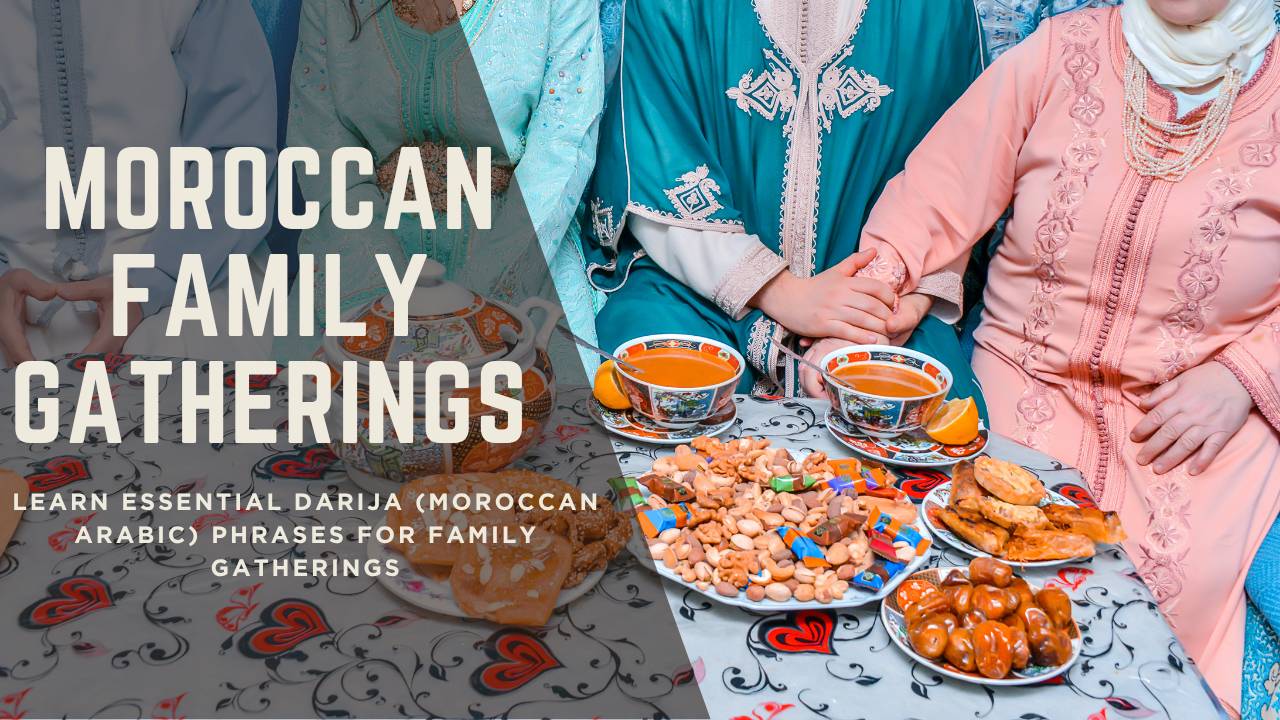Darija Phrases for Moroccan Family Gatherings

Introduction
If there’s one thing Moroccans love, it’s family time .
From weekend lunches to Eid celebrations, Moroccan family gatherings are full of laughter, stories, and food — and of course, lots of Darija!
In this post, you’ll learn the most useful Moroccan Arabic phrases and expressions you can use when visiting or spending time with Moroccan families. These will help you sound natural and connect more deeply with locals.
Greetings When You Arrive
When you visit a family gathering, greetings are very important. Expect to greet everyone individually — with kisses, handshakes, or a friendly “Salam.”
Darija Phrases:
| Darija | Meaning |
|---|---|
| Salam o 3alaykum | Peace be upon you |
| Wa 3alaykum o salam | And peace be upon you too |
| Labas 3lik? | How are you? |
| Kidayer / Kidayera? | How are you? (m / f) |
| Kolshi bikhir? | Everything good? |
| Mrahba bik / bikom! | Welcome! |
💡 Cultural Tip: When greeting elders, it’s polite to slightly bow your head or kiss their hand as a sign of respect.
Around the Table — Eating and Chatting
Family gatherings in Morocco always revolve around food. Whether it’s couscous on Friday or tagine on Sunday, the table is a place for warmth and connection.
Common Expressions:
| Darija | Meaning |
|---|---|
| Bsa7a! | Enjoy your meal / Bon appétit |
| Lah ya3tik sa7a | May God give you health |
| Kol! | Eat! |
| Zidk mazal | Have more (m / f) |
| Lmakla bnina! | The food is delicious! |
| Tbarak lah 3la lmakla! | God bless this meal! |
💡 Cultural Tip: Complimenting the food is a must! It shows appreciation for the host’s effort.
Talking with Family Members
Moroccan families love to chat — about work, school, travel, or just daily life. Here are some phrases you can use to join in.
| Darija | Meaning |
|---|---|
| Shno katdir / katdiri? | What do you do? (m / f) |
| Fin kat9ra / kat9ray? | Where do you study? |
| 3andek famila kbira? | Do you have a big family? |
| Kidayera lkhadma? | How’s work going? |
| Mazyan, lhamdulah! | Good, thank God! |
💡 Cultural Tip: Moroccans often mention “Lhamdulah” (Thank God) when answering questions about well-being. It’s a cultural norm expressing gratitude and humility.
Talking About Family Members
When you’re meeting relatives or talking about family, these words are helpful:
| Darija | Meaning |
|---|---|
| Lwalidin | Parents |
| Lfamila | Family |
| khoya/ khti | Brother / Sister |
| Jeddi/ Jeddati | Dad / Mom |
| 3ami / 3amti | Uncle / Aunt (father’s side) |
| Khali / Khalti | Uncle / Aunt (mother’s side) |
| Weld 3ami / bint 3amti | Cousin (m/f) |
Common Phrases for Special Family Moments
Whether it’s a wedding, a new baby, or someone returning from travel, family gatherings are full of beautiful expressions and blessings.
| Darija | Meaning |
|---|---|
| Mabrouk! | Congratulations! |
| Bsa7a o ra7a! | Wishing you health and rest! |
| Lah ykamal bikhir. | May God make it end well. |
| Thala f rask / raskom. | Take care (sg / pl). |
| Nshoufkom 3la khir! | See you soon / Take care! |
Sample Mini-Dialogue
A: Salam o 3alaykum! Labas 3likom?
B: Wa 3alaykum o salam! Kolshi bikhir, lhamdullah. Tfadal!
A: Shukran! Lmakla bnina bezaf!
B: Tbarak lah 3lik! Kol kol!
English Translation:
A: Peace be upon you! How are you all?
B: And peace be upon you too! Everything’s good, thank God. Please come in!
A: Thank you! The food is really delicious!
B: God bless you! Eat, eat!
💡 Cultural Note: Family = Warmth + Togetherness
Moroccan families are close-knit and expressive.
Gatherings are full of joy, teasing, and laughter — and the language reflects that warmth.
Learning these phrases will help you fit right in, whether you’re visiting Morocco or talking with Moroccan friends abroad.
🎓 Want to Speak Like Family?
Learn how Moroccans really talk at home with the Daily Darija Beginner & Intermediate Courses.
You’ll master essential family phrases, conversations, and cultural context — so you can speak confidently and naturally.
👉 Join the Daily Darija Course today and start speaking Moroccan Arabic with ease!

